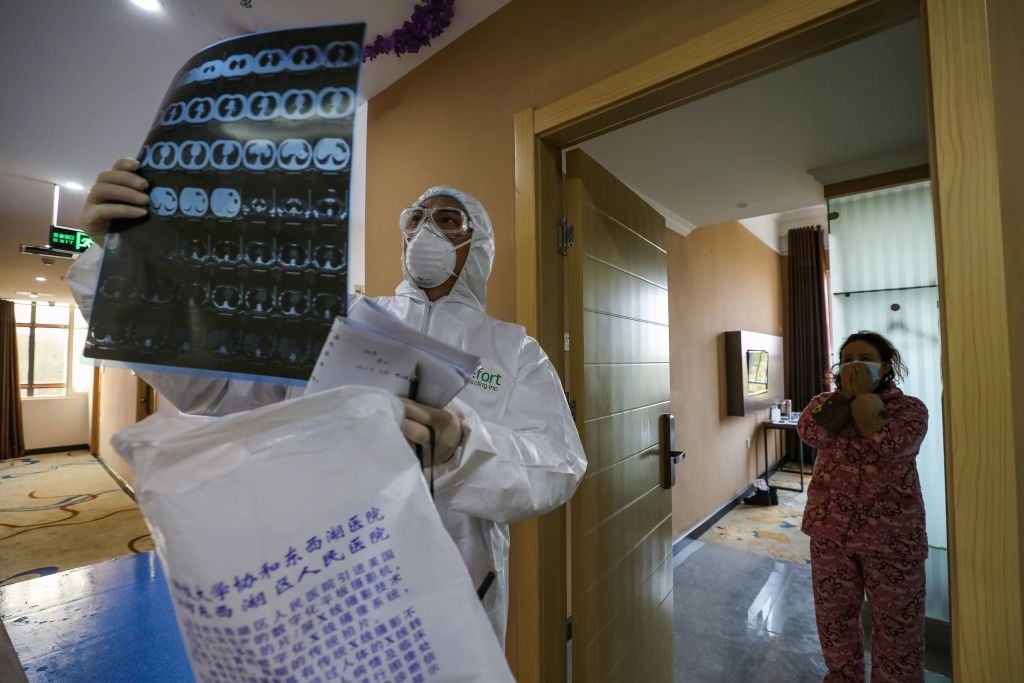‘Contagion’: What We Can Learn About the Coronavirus Pandemic From the 2011 Movie
Now that news about the coronavirus pandemic is taking up so much of our lives, many Americans are looking back to the 2011 movie Contagion. Unlike a more traditional disaster movie, Contagion takes a nuanced and well-researched approach to show how the United States might respond to a pandemic. Screenwriter Scott Z. Burns and director Steven Soderbergh tell the story of CDC scientists, government officials, and patients, who are all doing their best to beat the disease. Burns was recently asked about his advice on the 2020 COVID-19 situation–and it seems like there’s a lot we can learn from Contagion.
The 2011 pandemic movie is actually fairly accurate

Yes, Contagion is a movie–and we know Hollywood isn’t exactly known for its accuracy. Especially when it comes to medicine.
However, an article in New Scientist magazine actually praised Contagion for its dedication to correct information.
“It’s hard to name many Hollywood blockbusters that are as invested in the realities of science as Contagion.” They acknowledge that while it’s not perfect, Soderbergh and the whole Contagion team clearly put in the time to research what they were making a movie about.
Fortunately, the biggest difference between the disease in Contagion and COVID-19 is how many people it kills. The movie virus mortality rate is about 20%, while the real-world coronavirus rate is about 3%. Still, that number is affecting our most vulnerable populations–meaning we need a wide-scale response.
Listen to the medical experts, ‘Contagion’ screenwriter says
Contagion writer Scott Z. Burns told Slate what he thinks we should be doing about the COVID-19, ten years after his pandemic movie was made.
“I guess my feeling as someone who believes in science is that when scientists tell us those things we would do well to listen,” Burns said. He worried that as of now, we’re not doing enough of that. He told Slate:
It is incredible to me that we are not letting the really amazing public health people in this country lead the response—that we are finding out that we don’t have enough test kits and have for some reason disbanded our pandemic-preparedness teams.
Social distancing is a thing, ‘Contagion’ reminds us
Many scenes in Contagion hit a little close to home. Advice from CDC officials in the movie sounds very familiar–social distancing, washing your hands for 20 seconds, not touching your face. The CDC is now suggesting the same things to slow the spread of the coronavirus. Burns’ take:
…we can keep each other safe if we do the right things. And that means social distancing. That means washing your hands a lot. That means staying home if you are sick.
The writer of Contagion says that while the government has to take massive action, at this point: the people have the power to determine whether or not this public health crisis gets really bad–or not.
“If you talk about it with people in public health, until we have a pharmaceutically generated or a scientifically generated cure, we are the cure,” Burns said. “We can be the cure.”
Panic and misinformation don’t help anything
Burns said that the “gravest mistake” to make in this type of situation is “not giving the space and … the support to the public health officials who can help guide us through this.” The Contagion scribe wants to see even more of that. He told Slate:

I have read accounts in the press that Dr. [Anthony] Fauci isn’t really allowed to speak until Mike Pence has approved his messaging. That is concerning to me. If we are going to get through this in the best version, it is by empowering those people and giving them the resources that they need.
That’s because, in pandemics or other national crises, misinformation–and panic–can spread like wildfire. And that can be just as dangerous.
“If you go back and look at the poster, the tagline for the movie was ‘Nothing Spreads Like Fear,'” Burns said. “When Steven and I talked to public health officials, that was always their biggest concern.”
The Contagion writer advised:
I think we have to be really nuanced and responsible with each other about what is really important information for people to have to keep themselves safe, and what is inflaming panic.
Immediate government response is key, Scott Z. Burns of ‘Contagion’ argues
The writer criticized the United States government for not doing more in the immediate face of the crisis. Burns said:
The issue isn’t playing games with our borders; it’s how we take care of people now. It’s stunning to me that our administration can’t put out a clear message on how people can stay safe and what our tools are for understanding the current spread.

The Contagion screenwriter compared our response to Vietnam’s–and the U.S. comes up lacking.
“There’s a video on YouTube of a song they did in Vietnam about hand-washing…” he told Slate. “Why isn’t our government putting out public service messages about how to stay safe? That isn’t that hard.”
Health is fragile; wash your hands
Burns does have some hope for how we can handle COVID-19.
“I am encouraged by the ability of scientists to sort these things out, and I am grateful that the mortality rate of this virus is not like the one in the movie,” he told Slate. “I do believe that we will sort this out.” However, a lot of the responsibility to solve this crisis is in the hands of politicians.
“But it is really up to our government leadership to decide how fast we sort it out, and how many people need to suffer before they pull their heads out of their *sses,” the Contagion screenwriter concluded.
At the end of the day, health crises such as these remind us of one crucial thing. Our health is inherently fragile; our bodies and immune systems can only take so much. No, we are not all going to die–but the elderly and immunosuppressed are at a higher risk of doing just that–and they are not disposable members of our society. As the Contagion writer reminds us, let’s proceed with caution and protect the vulnerable. Because we would rather laugh at how we all overreacted than regret we didn’t do more.


